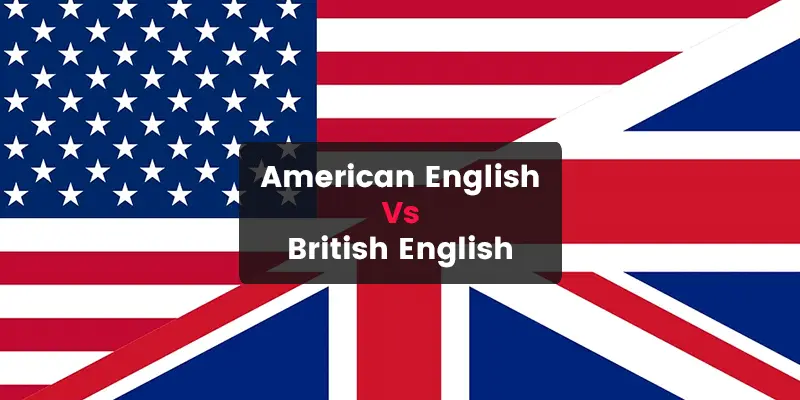You will not be surprised how English, known as a universal language, is widely spoken and understood across different countries and continents. However, it is interesting to note the diverse ways in which this language is spoken in the two dominant world powers, Great Britain and the United States. There are compelling differences in communication styles between these two nations, despite both being English-speaking. In this blog, let us find some interesting variations in the language when communicated orally in these two countries.
British English vs American English
It is not uncommon to encounter questions like, Which one is better? British English or American English? Which one to follow? Ideally, the answer to such questions is simple. As long as you are grammatically strong and communicate well both in writing and speaking, it does not matter if you follow any style. The difference in spellings and pronunciations is easy to remember and comply with. What matters is in-depth knowledge of the vocabulary of the language and the ability to express your thoughts in a unique, creative style. This is accomplished by making more efforts to encourage continuous reading and practicing a lot of descriptive writing. Enrolling in Spoken English Classes in Chennai makes this task easier for you if you live in Chennai. Consistent practice and a holistic approach to learning the language are the keys.
The Differences Between British English and American English are Based on
- Vocabulary
- Spellings
- Pronunciation
- Use of prepositions
Let us see them in detail with suitable examples below.
Vocabulary
It is quite remarkable to see how certain things, places, and objects are called in both of these countries. There is no doubt as to how these words should be referenced, yet they each have their own inherent identity. Let us see how some of the everyday spoken words differ in British English and American English.
| Common words in American English | Common words in British English |
| Apartment
Sofa Trunk Football French Fries Cotton Candy Garbage Pants Car park Toilet Awesome Cookie Truck Vacation Mailbox Store Soda College |
Flat
Couch Bonnet (front of the car) Boot (back of the car) Soccer Chips Candyfloss Rubbish Trousers Parking lot Loo Ace Biscuit Lorry Holiday Postbox Shop Fizzy drink University |
Spelling differences
There are changes in the spelling of the same word when written in both styles. Some words are given below and watch out for the differences.
| How the Americans write | How the British write |
| They use ‘ense’
Eg: defense. Offense. License |
They use ‘ence’
Eg: defence, offence, licence |
| They use ‘ed’Eg: burned, dreamed, leaped | They use ‘t’
Eg: burnt, dreamt, leapt |
| They use ‘ize’Eg: appetizer, familiarize, organize | They use ‘ise’
Eg: appetiser, familiarise, organise |
| They use ‘ll’Eg: enroll, fulfill, skillful | They use ‘l’
Eg: enrol, fulfil, skilful |
| They use ‘og’Eg: analog, monolog | They use ‘ogue’
Eg: analogue, monologue |
| They use ‘o’Eg: color, behavior, mold | They use ‘ou’
Eg: colour, behaviour, mould |
| They use ‘er’
Eg: meter, fiber, center |
They use ‘re’
Eg: metre, fibre, centre |
| They use ‘i’Eg: tire | They use ‘y’
Eg: tyre |
Pronunciation
Another way in which British English and American English differ is in the way words are pronounced. The removal of the letter ’r‘ in the British pronunciation is the most obvious distinction between it and the American. In the former, the r is only pronounced when it comes before a word or when it comes after a vowel. The ’r’ is always pronounced in American English. For example, the r in “park,” “sort,” “horse,” and other things would be pronounced in American rather than British English.
Use of Prepositions
The use of prepositions too is different in the two nations. Some common examples are here to make it clear.
1. On and At
American English: on the weekend
What is your plan on the weekend?
British English: at the weekend
What is your plan at the weekend?
2. In and At
American English: in college
She majored in Physics in college.
British English: at university
She studied Physics at university.
3. From and Than
American English: different than
This is different than what I imagined
British English: different from
This is different from what I imagined
Everyday conversations
The British English and American English show difference in normal talk also. Here are some daily conversations that are spoken differently in the two nations.
| How the Americans would say | How the British would say |
| Should we go? | Shall we go? |
| Let’s take a break | Lets have/take a break |
| How about we try that gain? | Shall we try that again? |
| Can I open the window? | Shall I open the window? |
| The band is good | The band is/are good |
How same words are used differently in both dialects?
Some words are used with the same spellings but yet differ in the way they mean according to the context in which they are used. Let us illustrate this point with examples.
1. Quite
In American English, the word ‘quite’ is used when you are ‘very sure’ about something. But, in British English, it simply means ‘ok’, and ‘still not sure about that’. Let’s see them in sample sentences.
Example:
American: I am quite tired now. I could sleep for days.
British: I’m quite certain she did well this time, but you could call the teacher to make sure.
2. Shall
‘Shall’ is used widely in Britain, whereas ‘will’ is used in its place in America.
Example:
American: I will finish this game in an hour.
British: I shall finish this game in an hour..
3. Needn’t and Shan’t
British English has the usage of “ Needn’t and Shan’t “ till date. But, you cannot find its usage in American English anymore. They prefer to use “ don’t and won’t “ instead.
American: You don’t need to work on this assignment.
British: You needn’t work on this assignment.
American: I won’t be that late.
British: I shan’t be that late.
Why is it important to learn the difference between American and British English?
Understanding the basic differences between American and British English helps us appreciate the cultural diversities of the two countries. Researching the language requires a more profound knowledge and insight into the dialects, the local slang, and the intriguing nuances each country has developed over generations. The proper use of
words, choice of spellings, and pronunciation help us understand the language’s richness in terms of culture and literature and prepare us to immerse ourselves in each country’s atmosphere. Acquiring knowledge through courses like IELTS would help to secure global work opportunities. The IELTS Course in Chennai will cover your needs and prepare you to take many competitive exams and clear international certifications.
To sum up, though there is diversification in the way the language is spoken, we cannot deny that British and American English have many similarities. It is always not difficult to follow them if you are strong in the fundamentals. Indians predominantly follow British English.





